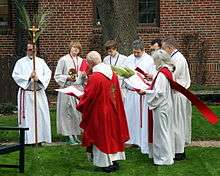Sacramentals

Sacramentals are material objects, things or actions (sacramentalia) set apart or blessed by the Roman and Eastern Catholic churches, the Eastern and Oriental Orthodox churches, the Church of the East, the Anglican churches, the Independent and Old Catholic churches, the Lutheran churches, and the Methodist churches to manifest the respect due to the sacraments and so to excite pious thoughts and to increase devotion.
Anglican

A text of the Episcopal Church in the United States of America includes items such as the Anglican rosary, ashes, and palms among objects counted as sacramentals.[1]
Catholic
Current usage
The Catholic Church currently defines sacramentals as "sacred signs which... signify effects, particularly of a spiritual nature, which are obtained through the intercession of the Church. By them men are disposed to receive the chief effect of the sacraments, and various occasions in life are rendered holy." [2]
Sacramentals do not confer the grace of the Holy Spirit in the way that the sacraments do, but by the Church’s prayer, they prepare one to receive grace and dispose a person to cooperate with it. “For well-disposed members of the faithful, the liturgy of the sacraments and sacramentals sanctifies almost every event of their lives with the divine grace which flows from the Paschal mystery of the Passion, Death, and Resurrection of Christ. From this source all sacraments and sacramentals draw their power.” [3]
The Catechism of the Catholic Church lists three types of sacramentals: blessings,[4] consecrations/dedications,[5] and exorcisms.[6]
The blessing at meals is an opportunity to offer God a prayer of praise and thanksgiving. Incense is both a sign of blessing and respect, and of prayer rising to God. Holy water recalls the sacrament of Baptism, and oil used in the sacraments as a symbol of healing the body and spirit.[7] Other sacramentals include: the Sign of the Cross, blessed salt, crucifixes, candles, blessed ashes and palms.[8] These are called sacramentals since they are intended for use in the celebration of Worship.[9]
Rosary beads, scapulars, medals and religious images are more accurately termed “devotional articles"; non-liturgical prayers such as the rosary, the stations of the cross, litanies, and novenas are called “popular devotions” or “expressions of popular piety”.[10]
The Latin Church allows the reception of certain sacramentals by non-Catholics.[11]
Pentecostal

Pentecostal theologian Mark Pearson states that Sacred Scripture speaks of sacramentals, sometimes referred to as points of contact, such as blessed prayer cloths (Acts 19:11-12) and holy oil (James 5:14).[12] He states that God is the source of healing and that Pentecostal clergy "can confidently offer prayer, administer the various sacramentals, and lay hands on the sick".[12]
References
- ↑ Armentrout, Don S. (1 January 2000). An Episcopal Dictionary of the Church: A User-Friendly Reference for Episcopalians. Church Publishing, Inc. p. 541. ISBN 9780898697018. Retrieved 9 April 2014.
- ↑ Sacrosanctum Concilium 60
- ↑ Catechism of the Catholic Church §1670
- ↑ Catechism of the Catholic Church §1671
- ↑ Catechism §1672.
- ↑ Catechism §1673.
- ↑ Van Vurst O.F.M., Jack. "Sacramentals", American Catholic, St. Anthony Messenger Press, October 17, 2005
- ↑ O'Neill, Eddie. "What are Sacramentals?", Our Sunday Visitor, November 1, 2014
- ↑ Chupungco, Anscar J., Liturgical Inculturation: Sacramentals, Religiosity, and Catechesis, p.55, Liturgical Press, 1992 ISBN 9780814661208
- ↑ Catechism §1674.
- ↑ Code of Canon Law 1170
- 1 2 Payne, Leanne (1 March 1996). Restoring the Christian Soul: Overcoming Barriers to Completion in Christ through Healing Prayer. Baker Books. p. 277. ISBN 9781441239570.
External links
 "Sacramentals". Encyclopædia Britannica. 23 (11th ed.). 1911.
"Sacramentals". Encyclopædia Britannica. 23 (11th ed.). 1911.-
 Leclercq, Henri (1913). "Sacramentals". Catholic Encyclopedia.
Leclercq, Henri (1913). "Sacramentals". Catholic Encyclopedia. - Catechism of the Catholic Church: Sacramentals